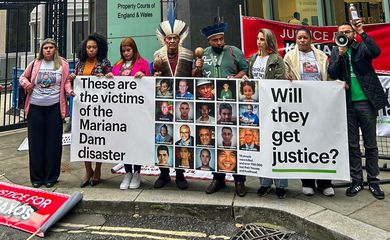Tragedy in Mariana: Government and mining companies ink BRL 132B deal

On Friday (Oct. 25), Brazil’s federal government and mining companies signed an agreement to pay BRL 132 billion in compensation to the companies affected by the tragedy in Mariana, Minas Gerais, in 2015. The amount aims to repair the damage caused by the collapse of the Fundão dam, managed by Samarco, a company controlled by mining companies Vale (Brazilian) and BHP Billiton (Anglo-Australian).

The first deal to compensate victims was signed back in 2016, but it was clear that a renegotiation would be required given the scale of the tragedy. Several lawsuits were also filed over the case. In 2018, talks resumed.
Of the BRL 132 billion stipulated in the accord, BRL 100 billion are new funds that must be paid over 20 years by the companies to the government, to be invested in various initiatives. The companies should also earmark BRL 32 billion to fund compensation for the people affected and reparation efforts that will remain their responsibility.
The companies claim to have so far disbursed BRL 38 billion in socio-environmental reparations through the Renova Foundation, which they created to conduct the reparation plans. The signing of the agreement will mean that the foundation will be abolished and Samarco itself will take on the obligations.
Prevention
At the signing ceremony at the Planalto presidential palace, in Brasília, President Luiz Inácio Lula da Silva called for investment in preventing this type of incident.
“I hope the mining companies have learned a lesson. It would have been much cheaper to prevent what happened—infinitely cheaper. It certainly wouldn’t have cost BRL 20 billion to avoid the disaster,” he said, criticizing privatization models.
“It’s difficult to negotiate with a corporation owned by someone we don’t even know. […] The money that could have prevented the disaster is often used to pay dividends,” the president went on to say.
President Lula also demanded that all the public officials involved monitor the measures closely in order to guarantee reparations for the victims. “We’re not dealing with strange things; we’re dealing with human beings. We may never be able to pay back all the damage these people have suffered—which includes the psychological damage as well as deaths, the damage to the things people loved and will never see again, for which there is no substitute,” he stated.
The tragedy
The human and environmental tragedy of Mariana occurred on November 5, 2015, with the collapse of the mining tailings dam. The district of Bento Rodrigues was completely devastated by the mud. Nineteen people died, three are still missing, and 600 people were left homeless.
Approximately 40 million cubic meters of toxic tailings were discharged into the environment, affecting 49 municipalities in the states of Minas Gerais and Espírito Santo. The mud traveled 663 kilometers along the Doce river basin, until it reached the sea off the coast of Espírito Santo.
Brazil’s Attorney-General Jorge Messias explained that the negotiations carried out until then had been insufficient, and new negotiations were held in 2023 and 2024, under President Lula. The terms had failed to include, for example, the removal of tailings, collective health activities, and individual compensation, which have been outlined in the new document.
“Today we are delivering an agreement that’s possible,” said the attorney-general. “[I’d like] to say to the victims, to the population of the Doce river basin, that we have taken a side. You can rest assured that every agreement reached so far has come in response to the historical demands of the communities,” he added.
The victims
The Movement of People Affected by Dams—MAB in the original Portuguese—which represents the victims of the tragedy, said, however, it did not have a seat at the negotiating table, “which was denied on the grounds of secrecy by the companies and the judiciary,” but movement members did acknowledge the importance of the new agreement.
“We hope the various programs will be put into effect. As a matter of fact, our movement helped propose a number of them. The collective aspect of the agreement is a step forward,” Joceli Andrioli, MAB’s national coordinator, told Rádio Nacional, calling for the participation of those affected in implementing the agreement and monitoring the progress of the measures.
In their view, the amount agreed is insufficient to achieve full reparation for the rights of those affected and the environment. “The struggle continues for fair compensation,” said Andrioli, explaining that a major shortcoming is individual rights, with extremely low amounts—BRL 35 thousand for those affected in general and BRL 95 thousand for the fishermen and farmers affected.
“We recognize the importance of the agreement and its strides for those affected, even though it does have shortcomings. The crime in Mariana and all the violations resulting from it are a direct result of privatization, which exploits the Brazilian people, seizes our wealth, and exclusively benefits the financial system and the greed of the big capital,” a statement released by the movement reads.
In 2023, Vale recorded net profits of BRL 39.9 billion, while BHP had profits of almost BRL 45 billion in the fiscal year ending in June this year.
The agreement must be ratified by the Supreme Court in order to “avoid the continued judicialization of various aspects of the conflict [in Brazil] and the prolongation of legal insecurity.” Until then, the lawsuits were handled by the federal court authorities in Minas Gerais.







